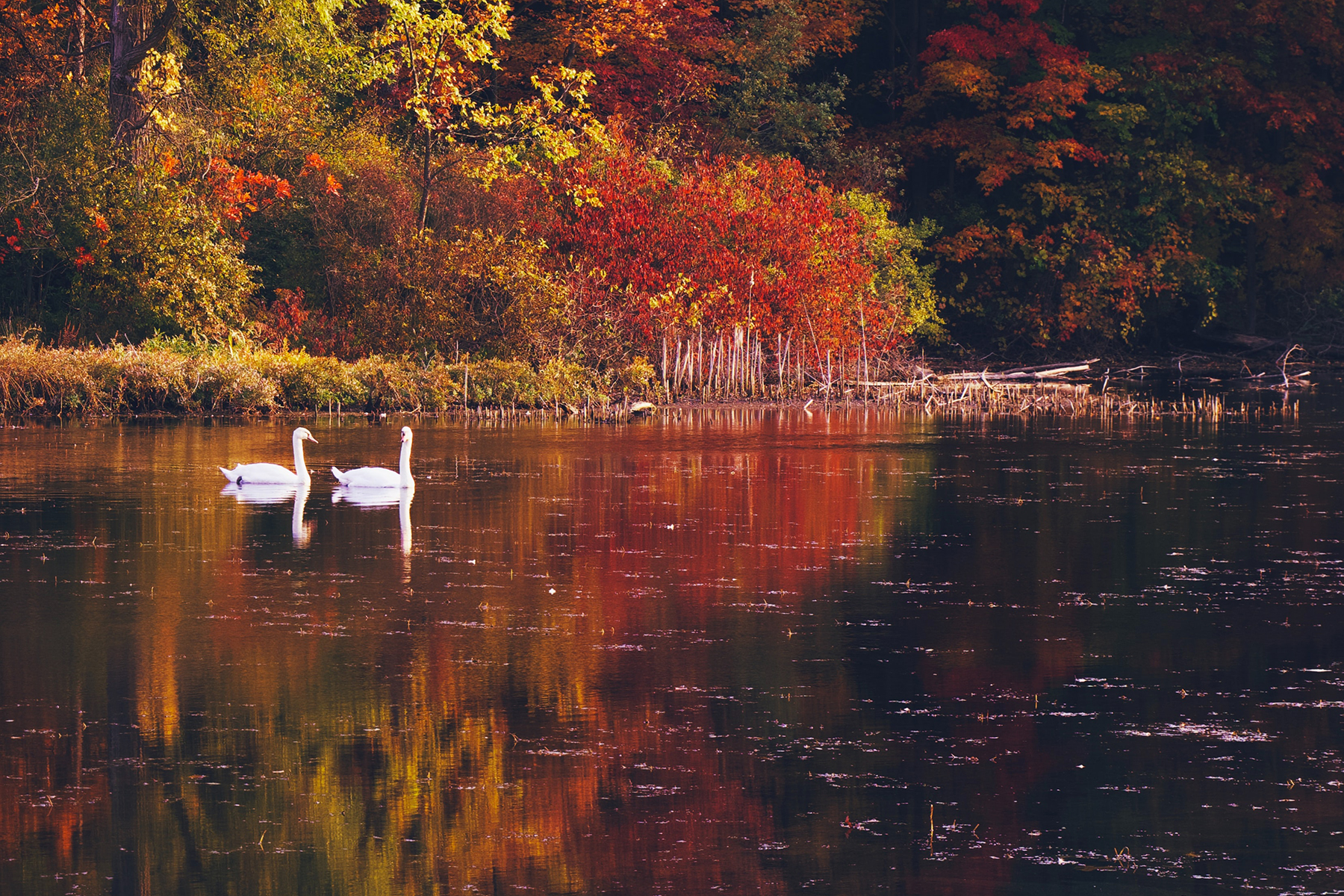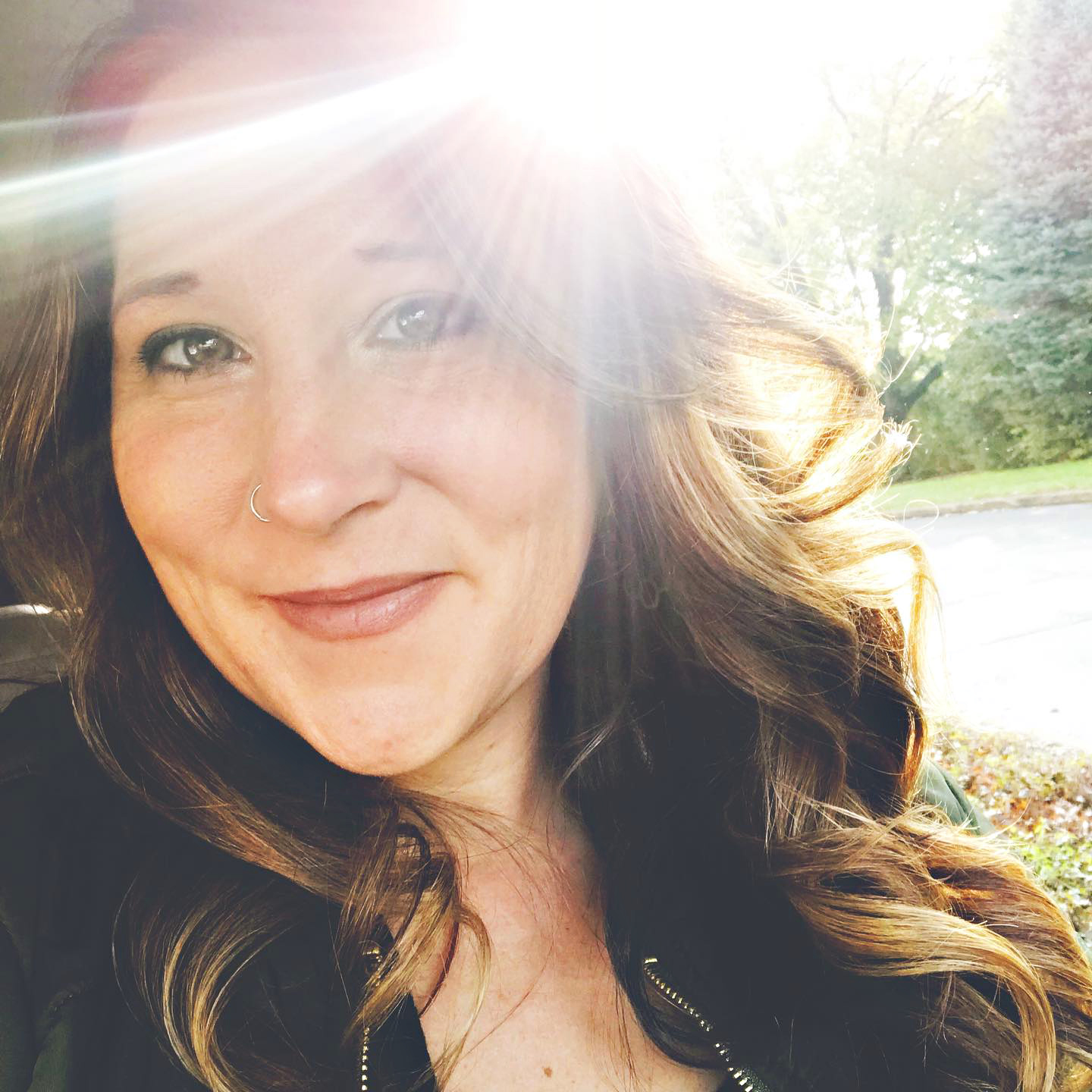Once a week, I sit in a green plastic lawn chair at the edge of a small pond. This hour is sacred to me—I guard it intentionally. This is the hour during which one of my daughters has a riding lesson, the hour I force myself to sit still, and the hour I take a few deep breaths and remember that the world really is beautiful, wonderful—magical, even. This hour helps to redeem the time spent reading too many news articles, or scrolling a few minutes too long on social media. Alone in the green chair by the pond, my thoughts turn from headlines to heartbeats. Beside the pond, I remember who God is, who I am, and that there is always more happening than I can see with my eyes, or understand with my mind.
I watch the geese circle the pond, mostly by webbed foot on the bank or by slow paddle in the water. Rarely (thankfully) are they above me. I listen to the sounds of the horses to my back, and the ones in the field in front of me, just across the pond. I am both out in the country and in the midst of suburbia all at once—one of the charming aspects of living where we live. But sometimes, the train passes along the tracks to my right, and I curse the bellowing of its terrible, deafening horn. The holler of that horn punches a hole in the idyllic scene I’m enjoying. My shoulders sag at the near-impossibility of escaping the mechanization of this world. I feel the thunder of its movement as the ground vibrates beneath my feet and up my back, all the way to my teeth. I resent the disruption.
This small machine-cut pond is enchanting. There’s a whole, mysterious ecosystem happening in and around the water, between the tall grass at the edges, and beneath the mirrored surface. A constant mystery unfolds before my eyes—seen, yet unseen—a reminder that the Kingdom of God is much like this.
Some weeks, my daughter has an early morning lesson, so I sit there in time to watch the sunrise. Other days it’s late afternoon before I find those moments in the chair. Over the course of a month, I will have been witness to a host of wildlife living out their own daily rhythms, despite my presence in their domain. I observe them with the eye of an admirer, with curiosity, with hope. Sitting beside the pond, I pay attention. Beside the pond, I bear witness to a good and true story—a story that cares nothing of clickbait headlines or “like” counts. Life at the pond is startlingly simple and paradoxically complex.
If we’ve been witness to anything these last many months, at least in part, we have beheld the disenchantment of a world fraught with conflict, scratching for hope. A world-wide pandemic and racial tensions, coupled with an intensely complicated election season, has left many of us tender and bruised in spirit. We have heard stories that have broken our hearts. We have lived stories that have left us shattered and weary. The painful ramifications of a disenchanted world have been felt across the broad spectrum of demographics and socio-economic status. People of the Way have been just as disenchanted by the current cultural climate as those who live life unsubscribed to any particular religion or faith practices. Many of us have come through these last several months limping, with the fabric of our faith a bit worse-for-wear.
We have seen enough.
We have seen too much.
We need so much healing—on the larger scale to be sure, but before that work can take hold, we need it to begin in each of our own hearts first. We need to remember that no matter how dark the world may seem, we are living in an enchanted Kingdom, where invisible redemptive regeneration is happening. We live in a world where wonder abounds.
In his book, Recapturing Wonder, Mike Cosper offers seven pathways for recovering the wonder of faith, for reawakening our souls and our senses to the mystery that is present now. These pathways, or spiritual practices, help reorient us towards the Hope we know exists for those who would call Jesus their friend.
The first, and arguably, the most important pathway Cosper offers up is a reminder to re-enchant our world by “reorient[ing] our lives around a different set of stories.” This looks like reading Scripture, participating in worship (both corporately and privately), and regular prayer. The stories we tell ourselves matter; the stories others tell us matter, too.
When I sit beside the pond, I listen to a story unlike anything I hear in headlines or on my social media feed. When I take in the scenes on the bank of the water, I remember that it’s not only the heavens that declare the glory of God (Psalm 19:1), but also the intricate, gossamer threads of a spiderweb strung between the tough leaves of cockscomb. Creation bears witness to God’s existence, to His glory, and when one stands still long enough to listen, the hymn of creation can be heard (Romans 1:20).
This one hour a week at the pond marks time for me. It is a rhythm that calibrates my days, inviting me to consider in sheer amazement the natural world that functions as designed—in my presence, but without my participation. The pond is a microcosm of the “New Creation” being actively redeemed in real time, before my eyes. In the comings and goings of the geese and the water bugs, with the bloom and wither of the weedy flowers that grow along the edges of the pond, I observe a rhythm set in motion by the Word of God, spoken into the dark, centuries—nay, eons—before I would ever bear witness to this magical dance. If I were not there to witness it, the natural order of the pond community would carry on, just as it should, just as God has ordained it to do.
Ponds seem natural places for reflection. The sky reflecting off the surface of the pond allows me to see what is above my head while looking down. I see both the pond and sky all at once. The magic of this sight helps me remember that God is like this in creation—both above and below us, showing up in unexpected ways and in unexpected places. Seeing the sky at ground level reminds me that God’s Kingdom is upside-down. How this is so, is beyond my comprehension. Any search for an explanation can only go so far. To believe this is true, requires faith. To remember that God’s story doesn’t read like any story the world offers, requires a re-enchanted imagination. I can’t recall a year where I’ve ever been so full of longing to hear the most enchanting story of all, the Story of the birth of King Jesus. The story of Jesus sent from Heaven’s hallways to a hay-filled stall, and ultimately to a cross, and back to Heaven again.
As the weather turns colder, my hour by the pond will be traded for an hour swaddled in my heated jacket, inside the barn where my daughter rides. I can’t bear the bitter wind of winter on my skin or the miserable discomfort of my battle with Raynaud’s syndrome—a painful reminder of my frailty, and a prompt to pray for others who also suffer from various aches and ailments.
While I will miss the view of the pond, a change of scene here is no loss. The rhythmic thrumming of horse hooves on hard ground is like a heartbeat. The rise and fall of my daughter in the saddle is a beautiful reminder that we are, each of us, made for different joys and with different giftings. Her story will not be my story, and yet they are intertwined in the bigger, most enchanted story of God’s Kingdom. Together she and I will marvel at the pond in winter, the way it turns to glass, and the way the frost turns the grasses to prisms. We will wonder at the way the horses’ coats grow shaggier in winter; a secret process that happens by design to help warm them. I will remind her of the greatest Story ever told, and teach her about the mysteries I’m learning beside the pond—of the overlapping circles of God’s redemptive work. I will encourage her to let herself believe the better Story, and to face the struggle for faith with a heart that remembers that there is always more happening than we can see.
The featured image is courtesy of Aaron Burden and is used with his generous permission for Cultivating and The Cultivating Project.
As a sequin-wearing, homeschooling mother of four, Kris is passionate about Jesus, people and words. Her heart beats to share the glorious truth about life in Christ. She’s been known to take gratuitous pictures of her culinary creations, causing mouths to water all across Instagram. Serving as an advocate for Compassion International, Kris is Managing Editor of The Cultivating Table for Cultivating. She is the author of, Come, Lord Jesus: The Weight of Waiting and Holey, Wholly, Holy: A Lenten Journey of Refinement, and Everything is Yours. Kris is the founder and host of Refine {the retreat}. She writes at kriscamealy.com.
Leave a Reply
A Field Guide to Cultivating ~ Essentials to Cultivating a Whole Life, Rooted in Christ, and Flourishing in Fellowship
Enjoy our gift to you as our Welcome to Cultivating! Discover the purpose of The Cultivating Project, and how you might find a "What, you too?" experience here with this fellowship of makers!


“We have seen enough. We have seen too much.” Yes.
This book sounds like a good one, kris. Thank you for sharing your moment by the pond.
“There is always more happening than we can see.” I am grateful for some moments searching the small beauty beside the pond with you, and this reminder. It can’t come too frequently these days. I’m grateful.